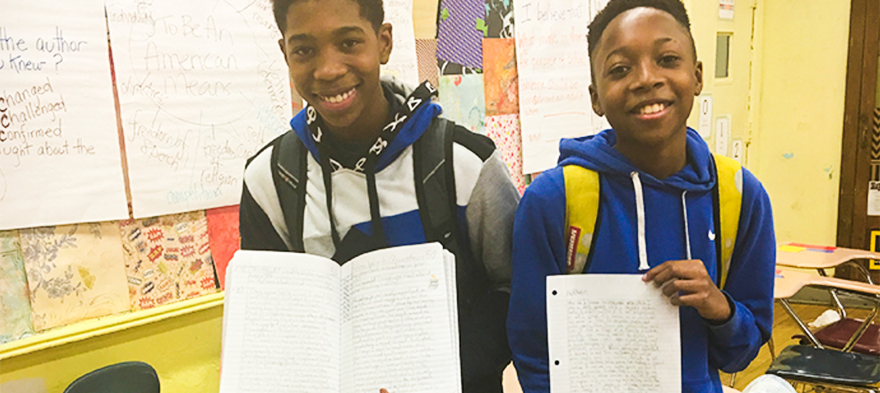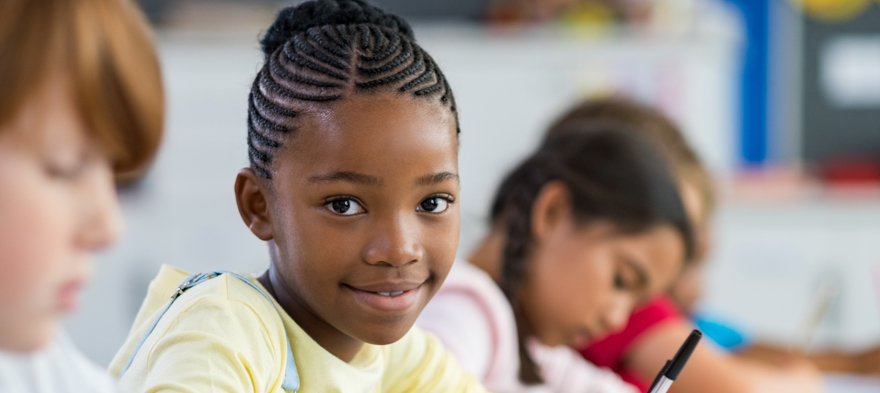My students and I began reading "The Narrative of the Life of Frederick Douglass" a few weeks ago. It’s a challenging read, vocabulary-wise, but they’re plowing through it—happily, for the most part, because they’re interested in what Douglass has to share. Yesterday, we arrived at chapter seven, a watershed section where Douglass explains in detail not only his desire to read and write, but how he attained those skills. Something about what Douglass wrote really touched my students and they began to ask questions and deeply engage with the text. Was Frederick Douglas better off before or after he taught himself how to read and write? Is ignorance truly bliss? Would he have had such a strong desire to be free if he hadn’t learned how to read and write? The energy in the class was buzzing. What was happening was not part of the lesson plan—this was much better. This organic, free-flowing learning couldn’t be planned. What ensued next was a genuine writing workshop. Not the “How to Write An Argumentative Essay” type of writing lesson—on the contrary. It was a journal-writing lesson focused around this writing invitation:
“How important is reading in your life? How would Douglass feel about your reading habits? How did you learn to read and write? How did your experience differ from Douglass’?”
At first, the kids were writing very politically-correct responses that were almost robotic. We had never done journal writing in my class and it was clear that all of the graded, argumentative writing, the citing textual evidence, the preponderance of informational texts that we’ve focused on heavily all year, had rendered them temporarily unable to write from an internally authentic, truthful, just-because creative space. I told them that, contrary to what they might think, I know them. I know that they don’t go home and engage in Drop Everything and Read (D.E.A.R.) time that they are assigned every night. Their little faces looked shocked at my candor. I told them to think about Douglass’ journey to becoming literate and to just write honestly about their own relationship with reading. Something clicked. The room got really quiet—that good quiet, not that awkward silence. I could hear their brains churning. More importantly, I could feel them pouring their hearts into their writing; however, I was totally unprepared for the responses of two students in particular, Khalil West and Shandon Foster. What they each wrote was profound and telling. One of the most formidable minds regarding the reading habits of young Black men is Dr. Alfred Tatum. According to an article from NEA Today:Black male students…who are underperforming in reading are 'disengaged from learning, lacking motivation, don’t like to read, and are doomed academically and in life if they are not reading proficiently by fourth grade.' Tatum adds that, untangling 'these things become major challenges for us as educators and parents.' [And] what should matter is 'Black boys' access to and relationships with text. It’s where teachers should focus.'As young Black men, so much is written from the perspective of others about what reading means to them, but less information is derived directly from those in that position. Below are Khalil West’s and Shandon Foster’s personal reflections on their individual relationships with books and reading.
How did I learn to read and write? While I was a very young child, I enjoyed reading books. It didn’t matter if it was interesting or not. I think it’s because as a child and me now, I like to impress people, show them me succeeding. I would love to read in front of family members, especially my mom. I wanted to make her proud and know that she’s doing a good job. I read a book everyday, but as I got older, I got different interests—video games and basketball. I learned to read from my teachers. My mother never really read me bedtime stories. As I got nine or ten, I had already lost my passion for reading. I stopped wanting to read, and my mother taught me that I have a privilege to read. Then I started to read again. There is always someone in my life I want to impress with my reading and writing skills. Now that I’m in the seventh-grade, I already learned soooo many things in about four to five months that involves reading and I love it. My life differed from Frederick Douglass because he loved reading his whole life. I stopped at a point, but don’t plan to again. —Khalil West
Reading is not really important in my life. I don’t enjoy reading besides small internet articles. I grew up not seeing anyone in my life just put time aside for reading books. The people around me never asked what books I like, or do you like to read. All they said was you need to read more. As I got older, I realized to work on getting a higher vocabulary I need to read. That’s when I knew I had to read more, so I started to read books once in a while. For me to read a book it had to be interesting. I have got books from people and they have stayed in the same place and took dust. I mostly read small articles like the daily mails on snapchat and articles on ESPN. Reading would have been different to me if I had someone pushing me about reading at an early age. I believe Douglass would feel I am lazy when it comes to reading habits. I have opportunities at hand that I don’t use. I should always be eager to read and build my knowledge on what has gone on, and what is going on in history. He would not be happy to know someone that has the ability to get such a wide variety of books. If he was in my position he would have been so happy. – Shandon FosterThere’s so much rich knowledge in these two journal entries—the important role that family input and print-rich homes play in one’s reading interest; the importance of access and exposure to culturally-relevant, interesting books; and seeing people in their every day lives read inside their home and school. May those of us who raise and teach young men of color use the information shared passionately by these two beautiful students of mine to make the changes necessary for more Black men to put reading (back) to the forefront of their lives. There’s too much at stake if we don’t.
An original version of this post appeared on New York School Talk as The Importance of Reading to Two Black, Urban Young Men.
Photo of Khalil and Shandon.

Vivett Dukes (nèe Hemans) is in her eighth year as a middle and high school English Language Arts teacher. For her first four years in the DOE, she taught in an all-male, all minority, urban public school in Southside Jamaica, Queens erected for the express purpose of counteracting the pervasive school-to-prison pipeline that disproportionately impacts Black and Brown boys. Currently, she is ...



